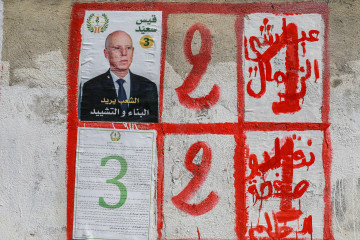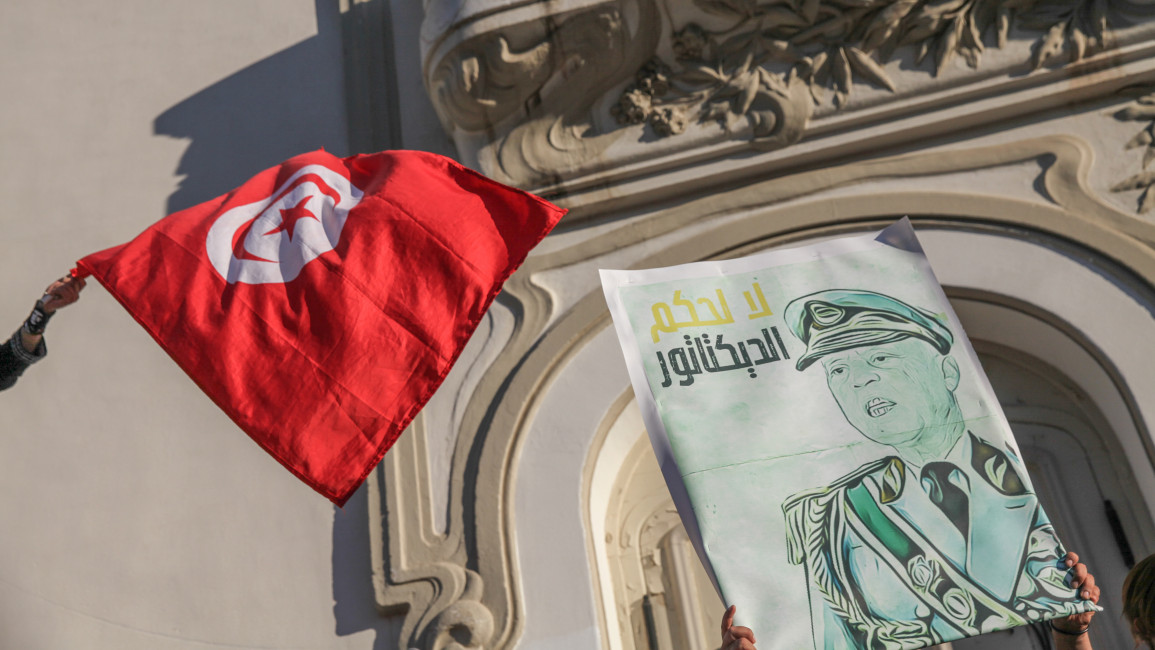

Blank, black frames on the walls where posters of Tunisian presidential candidates should be are all that remain of Tunisia's election slated for 6 October.
Once vibrant and alive with political energy, the streets of the capital now tell a story of indifference: no heated debates, no late-night ideological rows, and no change to look forward to.
In cafés and bars which used to be dominated by talk of pathways to democratic transition, Tunisians are now immersed in regional news from Gaza and Lebanon. National radio airs random songs, not hard-hitting interviews with presidential hopefuls, interrupted by news of capsized illegal migrant boats near Djerba, a symbol of the apathy looming over the country.
With only days left before Tunisians head to the polls to elect a new president, schools, markets, and public squares are empty of the posters and campaign material that covered every inch in the past. Today Tunisians are unable to participate fully in elections in the absence of electoral campaigns, candidate pluralism, and media coverage.
Once celebrated as the poster child of a newfound democracy in the region following the 2011 Arab uprisings, the few posters that do appear reflect the narrow race.
President Kais Saied, seeking a second term, faces just two opponents: Ayachi Zammel, leader of the Azimoun Movement, who just a few days ago was sentenced to 12 years in prison for allegedly "forging voter endorsements" and is hence unable to run his campaign; and Zouhair Maghzaoui, Secretary-General of the People's Movement, a former supporter of Saied, who has since parted ways with him.
Since his election, President Kais Saied has made no secret of his dissatisfaction with Tunisia’s 2014 post-revolution constitution which was written by elected members and ensured a semi-presidential system, the separation of powers, and the protection of human rights and freedoms.
On 25 July 2021, Saied made his first major move to consolidate power by invoking Article 80 to suspend parliament and dismiss Prime Minister Hichem Mechichi, citing a national emergency.
Exploiting public frustration over the mishandling of the Covid-19 pandemic, Saied framed his actions as necessary to "save the nation" from "thieves and foreign agents", according to Aymen Abderrahmen, a political commentator and co-founder of I-Watch Tunisia, an independent, anti-corruption non-profit associated with Transparency International.
"Saied’s rise to power and the public's support can be traced to the failures of Tunisia’s political elite,” Abderrahmen told The New Arab. “Their priority was to safeguard their positions rather than strengthen democratic institutions."
In February 2022, Saied made his most brazen attack on Tunisian democracy. He dissolved the Supreme Judicial Council, a respected independent body, and replaced it with a temporary council under his direct control. Along with the arbitrary dismissal of 57 judges, this marked a clear regression to the autocratic practices of Tunisia’s past, when the judiciary was merely a tool of repression.
"Just as previous governments failed to establish a Constitutional Court,” Abderrahmen says, “Saied dissolved the Supreme Judicial Council despite its advisory nature and replaced it with a temporary puppet council."
This move signalled a return to pre-2011 practices when former dictator Zine El Abidine Ben Ali controlled the judiciary to stifle dissent. Many Tunisians who had hoped the revolution would permanently end authoritarian rule are now witnessing history repeat itself.
According to activist Fidaa Hammami, the parallels between Tunisia's 2024 presidential election and the 2009 election under Ben Ali are striking in how Tunisians lacked faith in elections as a tool for change.
|
|
“Unlike now, the elections of 2014 and 2019 were seen as genuine vehicles for transformation, through the ballot box,” Hammami told TNA. “Citizens could choose from a wide pool of candidates, with 27 candidates competing in 2014 and 26 candidates in 2019,” she explained.
“They were organised by independent bodies, featured televised debates, and saw extensive voter education campaigns and robust media coverage, allowing people to make informed decisions. They were also monitored by local and international observers from civil society and political parties, ensuring transparency and accountability.”
In contrast, the 2024 election under President Saied shows a marked decline in these democratic mechanisms. The Independent High Authority for Elections (ISIE), now controlled by Saied as he appointed all its members, has restricted access to election observers by refusing accreditation to civil society organisations, media outlets, and independent journalists.
The application process for candidates was also deliberately obstructed, resulting in only 17 valid submissions of over 100 anticipated candidates. Ultimately, ISIE approved only three candidates, one of whom was Saied. Even when Tunisia’s Administrative Court ruled that three disqualified candidates should be reinstated, ISIE refused to comply, further solidifying Saied’s grip on the process.
Hammami says this bears a strong resemblance to the 2009 election under Ben Ali, when the outcome was never in doubt. Ben Ali manipulated state institutions like the judiciary, electoral bodies, the interior ministry, and state-controlled media to suppress opposition, rig the voting process, and maintain his authoritarian grip on power.
Saied’s use of the ISIE and the Tunisian parliament mirrors Ben Ali’s strategy. The sitting parliament, already weakened by an abysmal 11% voter turnout during the latest vote, has become a rubber stamp for executive-led initiatives, passing laws largely related to loan agreements or top-down proposals.
The recent amendment to the electoral law is proof of the weakness of the legislative body and its inability to work independently, as it helped consolidate power in Saied’s hands under a new constitution he authored to weaken key democratic safeguards.
Furthermore Saied introduced Decree Law 2022- 54, which, under the guise of combating cybercrime clamped down on freedom of speech and press freedom.
In their recent report, the Intersection Association for Rights and Freedoms highlighted the significant human rights violations committed in Tunisia since Saied took office.
According to Montasar Salem, a legal researcher at Intersection, Decree Law 2022-54 undermined many of Tunisia’s post-revolutionary gains by criminalising speech critical of the government, particularly on social media platforms. It has become another brick in the wall of oppression, weaponised to arrest those who dare to participate in the political scene, whether by engaging in electoral campaigns or using creative channels to voice their criticism about the reality they face.
"Since the introduction of Decree Law 2022-54, 46 legal cases have been raised against journalists, activists, and citizens,” Salem told TNA. “They were prosecuted for statements deemed harmful or false.”
High-profile cases include that of journalist Salah Attia, who was tried in a military court and sentenced to prison for criticising the military's role in politics. There is also the case of political activist Chaima Issa, who was charged for publicly criticising the president’s power grab.
“The law was also used to target ordinary people, who use social media to express their opinions,” says Salem.
As the political landscape becomes more bleak, Tunisia’s economic crisis worsens. According to the World Bank’s Economic Monitor, youth unemployment has soared to nearly 30%, while inflation hit 10.4% in 2023. A staggering 83,000 jobs were lost last year alone, leading many young Tunisians to seek better lives abroad.
"What’s happening today is worse than under Ben Ali," says Abderrahmen. "Back then, at least Tunisian youth had some hope of social mobility through education and a relatively stable economy. Today, there’s nothing but despair. Their only hope is to leave the country.”
This article is published in collaboration with Egab




 Follow the Middle East's top stories in English at The New Arab on Google News
Follow the Middle East's top stories in English at The New Arab on Google News


